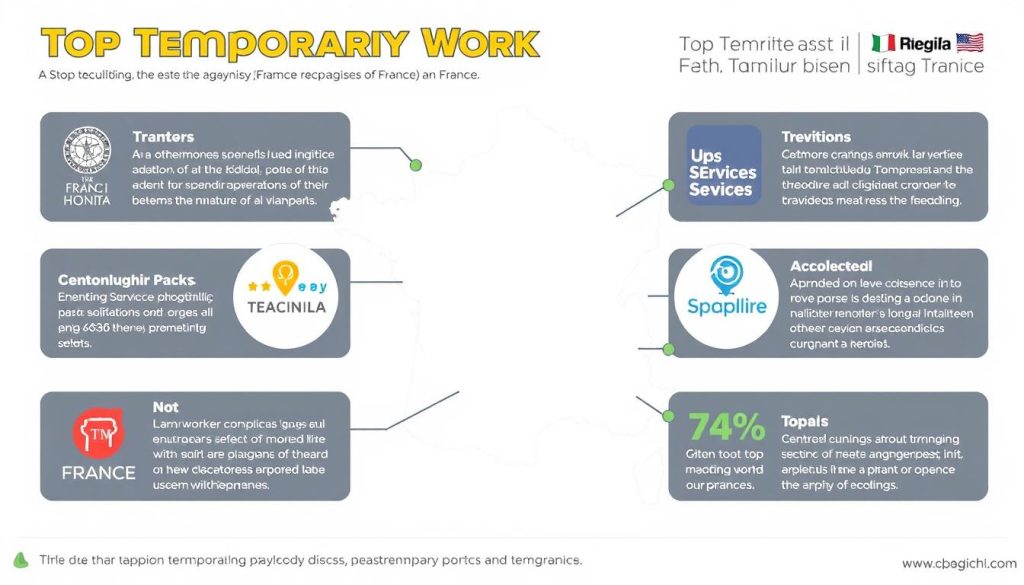Navigating the complex landscape of temporary employment in France can be daunting, but with the right guidance, it can also be a strategic career move. Understanding the intricacies of contract types, duration, and employee rights is crucial for securing stable and beneficial work arrangements.
Our expertise provides a secure pathway to employment opportunities, helping both French nationals and foreign workers secure legitimate temporary positions with proper documentation. By leveraging our service, you can maximize the benefits of temporary contracts while minimizing associated risks.
Table of Contents
Key Takeaways
- Understanding the French employment landscape is key to securing beneficial work arrangements.
- Our expertise helps navigate complex contract regulations governing temporary employment.
- Learn how to leverage temporary contracts as stepping stones toward permanent employment.
- Discover how security in temporary work comes from knowing your rights and obligations.
- Maximize the benefits of temporary employment with our expert guidance.
Understanding Temporary Work in France
Understanding the nuances of temporary employment is crucial for both workers and employers in France. Temporary work, also known as temping, involves a temporary work agency hiring an employee under a temporary employment contract to fulfill a specific role at a client company.
What Defines Temporary Employment
Temporary employment is characterized by a temporary employment contract that specifies the duration and conditions of the employment. This type of contract is used for a particular project or to replace an absent employee. The contract includes details such as the period of employment, the nature of the work, and the conditions under which the employee will work.
According to French law, temporary contracts require specific justifications, such as replacing an absent employee or managing seasonal fluctuations. The duration of these contracts is legally limited, ranging from 9 to 36 months depending on the assignment’s nature.
Key Differences Between Temporary and Permanent Contracts
The primary distinction between temporary and permanent contracts lies in their duration and termination procedures. Permanent contracts (CDI – Contrat à Durée Indéterminée) have no fixed end date, whereas temporary contracts (CDD – Contrat à Durée Déterminée) specify a termination date or completion condition.
As noted by employment law experts, « Temporary contracts offer flexibility but come with certain limitations, such as restricted duration and renewal possibilities. » In contrast, permanent contracts provide greater job security but are less flexible. Temporary employees receive an end-of-contract premium (prime de précarité) to compensate for employment instability.
Benefits of Choosing Temporary Work Placements

The advantages of temporary work placements are multifaceted, providing opportunities for skill development and employment security. Temporary work offers a range of benefits that can enhance your career prospects and provide a pathway to permanent employment.
Flexibility and Work-Life Balance
Temporary work placements offer the flexibility to choose assignments that fit your schedule, allowing for a better work-life balance. This flexibility is particularly beneficial for individuals who need to balance work with other responsibilities or personal commitments. As stated by a career expert, « Temporary work arrangements can provide the flexibility that many professionals need to manage their personal and professional lives effectively. »
Skill Development Across Various Industries
Temporary assignments provide opportunities to develop skills across various industries, enhancing your marketability for permanent positions. By working in different environments, you can gain a broad range of experiences and build a diverse skill set. Temporary work frequently serves as an extended interview process, allowing employers to evaluate your skills and cultural fit before offering permanent positions.
Pathway to Permanent Employment
Many companies use temporary assignments as a recruitment strategy, filling permanent vacancies with proven temporary workers. Temporary placements provide opportunities to demonstrate your value directly to hiring managers, bypassing traditional application processes. As a result, temporary work can be a direct pathway to employment security. In fact, statistics show that a significant percentage of temporary workers transition to permanent positions within the same companies.
By choosing temporary work placements, you can gain the experience and skills needed to secure a permanent position. With the right strategy and mindset, temporary work can be a stepping stone to a successful and fulfilling career.
Essential Documentation for Temporary Workers
To ensure a seamless onboarding process, it’s vital for temporary workers to have the correct documentation in place. As a temporary worker in France, being aware of the necessary documents is crucial for a successful assignment.
Required Permits and Visas for Foreign Workers
For non-EU citizens, obtaining the appropriate permits and visas is a critical step. The temporary work visa is essential for legally working in France. To apply, you’ll need to provide a valid identification document and proof of your employment contract.
The process involves submitting your application to the relevant French authorities, and the requirements may vary depending on your nationality and the specifics of your employment.
Understanding Your Employment Contract
Your employment contract is a legally binding document that outlines the terms and conditions of your temporary work assignment. It’s essential to understand the probationary period, which varies based on the contract duration.
For instance, a contract lasting less than or equal to one month has a probationary period of two days, while a contract between one and two months has three days, and contracts over two months have five days.
Documentation Checklist for New Assignments
To prepare for your temporary work assignment, gather the following essential documents:
- Valid identification document (passport or national ID card) and residence permit if you’re a non-EU citizen.
- Employment contract signed by both you and your temporary work agency.
- Proof of address (utility bills, rental agreement).
- Banking information for salary payments, including IBAN and BIC codes.
- Written assignment letter detailing workplace, supervisor contact, and reporting instructions.
- Required professional certifications or qualifications.
- Social security number and documentation (carte vitale) for health insurance.
- Written information about workplace safety protocols.
- Documentation regarding working hours, break periods, and workplace regulations.
Maintaining copies of all signed documents is crucial for your personal records throughout the contract duration.
How to Find Legitimate Temporary Work Opportunities
Navigating the temporary work landscape in France demands a combination of strategy and knowledge. To successfully find legitimate temporary work opportunities, it’s crucial to understand the various channels and resources available.
Temporary work agencies play a significant role in connecting workers with employers. Let’s explore some key strategies for finding temporary work.
Utilizing Temporary Work Agencies in France
Temporary work agencies specialize in matching workers with temporary positions. Some of the best temporary work agencies in France include:

Online Platforms for Temporary Job Searches
Online platforms are another vital resource for finding temporary work. Popular job boards and career websites often list temporary positions.
Networking Strategies for Temporary Positions
Effective networking is key to uncovering temporary work opportunities. Consider the following strategies:
- Inform your professional and personal networks about your interest in temporary work.
- Attend industry events, job fairs, and professional meetups.
- Join professional associations in your field.
- Leverage social media platforms, particularly LinkedIn.
- Follow target companies on social media.
- Reconnect with former colleagues and supervisors.
- Create business cards highlighting your availability for temporary work.
- Consider volunteering strategically.
- Develop an « elevator pitch » that clearly communicates your value.
- Maintain regular contact with your network contacts.
- Connect with other temporary workers to share leads.
By combining these strategies, you can increase your chances of finding legitimate temporary work opportunities in France.
Understanding Your Rights as a Temporary Worker
The rights of temporary workers in France are protected by law, ensuring they receive fair treatment and safe working conditions. As a temporary worker, understanding your rights is crucial for a secure and satisfactory work experience.
Equal Treatment Provisions
Temporary workers are entitled to equal treatment provisions, which ensure they receive the same rights as permanent employees in similar positions. This includes equal pay for equal work, access to company facilities, and non-discrimination in the workplace. The principle of equal treatment is fundamental in protecting temporary workers from unfair practices.
Compensation and Benefits Entitlements
Temporary workers are entitled to various compensation and benefits. At the end of each contract, temporary workers receive end-of-contract compensation, known as the prime de précarité (instability allowance), which is at least 10% of their total gross remuneration. However, this bonus is not payable in certain cases, such as when a permanent contract is signed immediately after the assignment, or when the contract is terminated due to serious misconduct. Understanding these entitlements helps temporary workers manage their finances effectively.
- End-of-contract compensation is calculated based on total gross remuneration, including contract renewal periods.
- Exceptions to receiving the prime de précarité include signing a permanent contract or contract termination due to misconduct.
- Temporary workers may also be entitled to paid leave compensation, depending on their contract terms.
Health and Safety Protections
Temporary workers receive the same health and safety protections as permanent employees. Both the temporary work agency and the client company share responsibility for ensuring a safe working environment. Temporary workers have the right to proper safety training, access to occupational health services, and the right to refuse dangerous work without penalty.
- Temporary workers must receive safety training specific to their workplace and tasks before starting an assignment.
- The client company must provide appropriate personal protective equipment and ensure safe working conditions.
- Temporary workers can report safety violations to labor inspectors without fear of retaliation.
Understanding your rights as a temporary worker in France is key to a secure and satisfactory work experience. By knowing what you’re entitled to, you can better navigate the job market and ensure your rights are respected.
Navigating Contract Duration and Renewals
Navigating the complexities of temporary work contract durations and renewals is essential for both employers and temporary employees. Understanding these aspects can help ensure a smooth and compliant working relationship.
Maximum Duration Rules by Assignment Type
Temporary work contracts in France have specific maximum duration rules that vary by assignment type. For instance, contracts for temporary replacements have different durations compared to those for seasonal work. Employers must adhere to these rules to avoid non-compliance.
| Assignment Type | Maximum Duration |
|---|---|
| Temporary Replacement | 18 months |
| Seasonal Work | 6 months |
| Specific Project | Duration of the project |
Contract Renewal Process and Limitations
The renewal of temporary work contracts is subject to specific regulations. Employers can renew contracts under certain conditions, but there are limitations to prevent indefinite temporary employment. Employers must ensure that renewals comply with legal requirements.
- Renewals are allowed for specific reasons, such as extensions of project duration.
- There are limits on the number of renewals to prevent abuse.
- Employers must notify employees of renewal details in writing.
Transitioning from Temporary to Permanent Status
Temporary employees may be offered permanent contracts under certain conditions. The employer must propose this in writing, specifying a reflection period for the employee to consider the offer. This transition involves terminating the temporary contract and establishing a direct employment relationship.
Securing End-of-Contract Compensation

Understanding your rights to end-of-contract compensation is crucial for temporary workers in France. When a temporary contract ends, workers may be entitled to certain compensations, which are governed by specific rules. This compensation is designed to provide financial support during the transition between contracts.
Understanding the Prime de Précarité
The Prime de Précarité, or Instability Allowance, is a compensation paid to temporary workers at the end of their contract. This allowance is typically 10% of the total gross salary earned during the contract. It’s a crucial financial support mechanism for workers between assignments. For more information on temporary work and its differences from other forms of employment, you can visit our comprehensive guide.
Paid Leave Compensation Rights
Temporary workers are also entitled to paid leave compensation. This compensation is calculated based on the number of days of paid leave acquired during the contract but not taken. Ensuring you receive this compensation is vital for your financial planning.
Exceptions to Compensation Entitlements
There are specific cases where the end-of-contract compensation is not payable. For instance:
- If you sign a permanent contract with the user company immediately after the end of the assignment.
- If the user company provides you with additional professional training at the end of the assignment.
- If you choose to terminate your contract before it expires.
- If the contract is terminated due to serious misconduct or Force Majeure.
- If the contract is for seasonal work.
Understanding these exceptions helps you make informed decisions about your contract and potential payment entitlements. It’s essential to be aware of these rules to navigate your employment rights effectively.
Building a Successful Career Through Temporary Work
Building a successful career through temporary work requires strategic planning and a proactive approach. By leveraging temporary work placements, professionals can gain diverse experience across multiple industries and business environments. To maximize the benefits, it’s essential to develop a systematic approach to documenting achievements and skills gained during each assignment.
Creating a professional development plan that targets skill gaps and identifies opportunities for growth is crucial. Building strong relationships with temporary work agencies and maintaining regular communication can lead to more opportunities. Additionally, leveraging each assignment as a networking opportunity can help connect with permanent employees and management, potentially opening doors to future employment.
To further enhance career prospects, consider developing expertise in high-demand areas, managing finances strategically, and investing time in continuous learning. For more information on navigating the temporary work landscape and optimizing your career strategy, visit our resource page at temporary work solutions. By adopting these strategies, temporary workers can build a successful and sustainable career, achieving both professional growth and financial security.
FAQ
What is the maximum duration of an employment contract?
The maximum duration of an employment contract varies depending on the type of assignment and the employer’s needs. In general, it can range from a few months to several years, but it is subject to specific regulations and renewal limitations.
How do I know if I’m eligible for end-of-contract compensation?
You’re eligible for end-of-contract compensation, also known as the Prime de Précarité, if you’ve been employed on a fixed-term contract and meet certain conditions. The amount is typically a percentage of your total gross salary.
Can I transition from a temporary to a permanent employee?
Yes, it’s possible to transition from a temporary to a permanent employee. This often depends on the employer’s needs and your performance during your temporary assignment. Your employer must provide you with a permanent contract or notify you of the end of your temporary contract.
What are my rights regarding health and safety protections as a temporary worker?
As a temporary worker, you’re entitled to the same health and safety protections as permanent employees. Your employer must provide a safe working environment, training, and necessary equipment to perform your job.
How do I find legitimate temporary job opportunities in France?
You can find legitimate temporary job opportunities in France by utilizing reputable temporary work agencies, online job platforms, and networking strategies. Research and verify the credibility of any potential employer or agency before applying.
What documentation do I need to provide for a new temporary assignment?
For a new temporary assignment, you’ll typically need to provide identification documents, employment contract, and any required permits or visas. Your employer or temporary work agency will guide you through the necessary documentation.
Are temporary workers entitled to equal treatment provisions?
Yes, temporary workers are entitled to equal treatment provisions, which include equal pay, benefits, and working conditions compared to permanent employees performing similar tasks.
Can my employment contract be renewed, and if so, under what conditions?
Your employment contract can be renewed under certain conditions, depending on the type of contract and the employer’s needs. The renewal process and limitations are subject to specific regulations and must be clearly stated in your contract.





